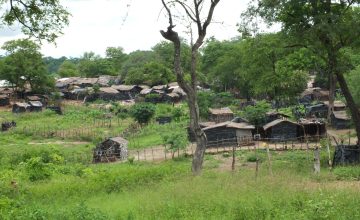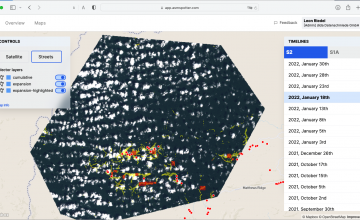
Levin Sources works with a range of individual businesses and governmental bodies, as well as industry and multi-stakeholder groupings, to help build a truly just and sustainable automotive sector that operates with respect for people and the environment across the entire production and use cycle of the vehicle.

Read our 2022-2023 carbon footprint report and discover how we ensure that our reporting of emissions, environmental policy and actions is accurate and specific.

Shared insight from miners from Latin America, Africa and South-east Asia con challenges such as gender-based violence, lack of access to finance, land and markets, guaranteeing health and safety for miners, and combating prevalent narratives about the sector.

From organisational development to environment management: explore three targeted approaches to formalisation implemented in cooperatives in Mozambique.

Discover how the government of Guyana used the ASMSpotter to support its observation of the local ASM sector.

Our third Carbon Footprint report is symptomatic of how the minerals and mining sector and world are reopening post-pandemic.

The Forest-Smart Artisanal and Small-Scale Mining (FS-ASM) Bolt-on Standard (the Bolt-on Standard) is now available for use by artisanal and small-scale miners, their state regulators, and their customers.

USAID’s Zahabu Safi (Clean Gold) Project challenges negative assumptions about how DRC gold is extracted, associated risks, and how responsible mid-and downstream actors can tackle them.

An overview of tools companies that use minerals and metals in their products – or produce them – have at their disposal to demonstrate responsible sourcing.

Women in mining-affected communities feel the impact of unsustainable and environmentally harmful practices disproportionately. We explore their crucial role in tackling the environmental challenges in mineral production and trading.

You're motivated to improve your minerals supply chain’s sustainability by environmental and human factors. But where do you start?

At Levin Sources, we don’t think about supply chains only in terms of avoiding harm and managing risks, we are squarely in the camp of opportunity maximisation. Find out more in this article.

Discover the four NGOs we are donating to as part of our strategy to offset our carbon footprint past and present.

Levin Sources delivered a comprehensive review of existing instruments that can help strengthen the EU Regulation on Batteries and Waste Batteries for Transport and Environment.

On International Day of Forests, we celebrate the New York Declaration on Forests and urge more mining and minerals institutions should get involved.

This World Bank-funded project is looking to develop a ‘Bolt-on’ Standard and guideline for forest-smart mining (FSM) in the artisanal and small-scale mining (ASM) sector.

What a year it's been! Here our Founder and CEO Estelle Levin-Nally looks back at 2020 and what the pandemic has meant for Levin Sources and the mining and minerals sector at large.

Our new report is packed with case studies and practical entry points for reducing mining’s impacts on forests.

Discover how we used our environmental expertise to help International Women in Mining with their carbon accounting and mitigation.

Sharing tips and recommendations learnt from monitoring our carbon footprint and from our wider environmental work.

Levin Sources drafted a report that paved the way for a Central African ASM sector that contributes to socio-economic development, peace and poverty reduction at both community and national levels.

As a social enterprise, Levin Sources is committed to clean growth and to going beyond compliance in relation to our environmental and social performance. Today, we are encouraging other companies and organisations to do the same by unveiling our Environmental Policy.

In 2019, Levin Sources signed onto the New York Declaration on Forests, a partnership to halve deforestation by 2020, and end it by 2030. The world has lost 50% of its forests already, and we are losing 48 football fields of forest every minute.

Levin Sources has been working to identify and analyse good and bad practices of artisanal and small-scale mining in forest landscapes in order to find opportunities for positive intervention.

We undertook a series of case studies to identify and analyse good and bad practices of ASM in forest landscapes for The Program on Forests (PROFOR), hosted by the World Bank Group.

Levin Sources has become a signatory of the New York Declaration on Forests, demonstrating our commitment to protect forests through our own work and our influence in the sector.

Levin Sources organised and coordinated a workshop in Astana, Kazakhstan, on absorbent technologies to treat waters polluted by toxic metals.

Levin Sources prepared the environment management measures linked to ASM and provided advice on LSM – ASM relations, including LSM operations and relationships with illegal stone pickers.

This report details a case study of historical and contemporary artisanal and small-scale mining (ASM) in and around Sapo National Park (SNP), assesses the ecological, social, and economic impacts of ASM, the key motivations of diggers/miners, the responses of affected stakeholders, including the sustainability of the 2010 SNP eviction and makes recommendations for future action.

ASM-PACE addressed the impacts of Artisanal and Small-scale Mining (ASM) occurring in protected areas and critical ecosystems (PACE).

Our case study of international best practices in ASM rehabilitation draws upon examples from arid and semi-arid ecosystems in Africa, Latin America, and Asia that have demonstrated success and are relevant to the Mongolian context.

An overview of two Levin Sources-hosted ASM-PACE roundtables in Washington D.C. and London, in collaboration with the World Wildlife Fund for Nature (WWF).

Levin Sources conducted a specialist ASM study for a client who was in the process of developing a historic gold mine in the conflict-affected district of Ituri in the DRC.

Artisanal mining, which supports millions but poses environmental and legal challenges, has a concerning link to wildlife poaching, highlighting the importance of formalisation for sustainability.

Madre de Dios, Peru, faces challenges in gold mining sustainability. Proposed archipelago model aims for responsible mining, balancing environment and development

Embedding sustainability in a Sustainable Human Development Index offers insights into ASM conservation with tailored standards for ecosystems.

Explore how the Minamata Convention recognizes ASGM's mercury impact, emphasizing transition strategies over bans to safeguard the environment and support miners.